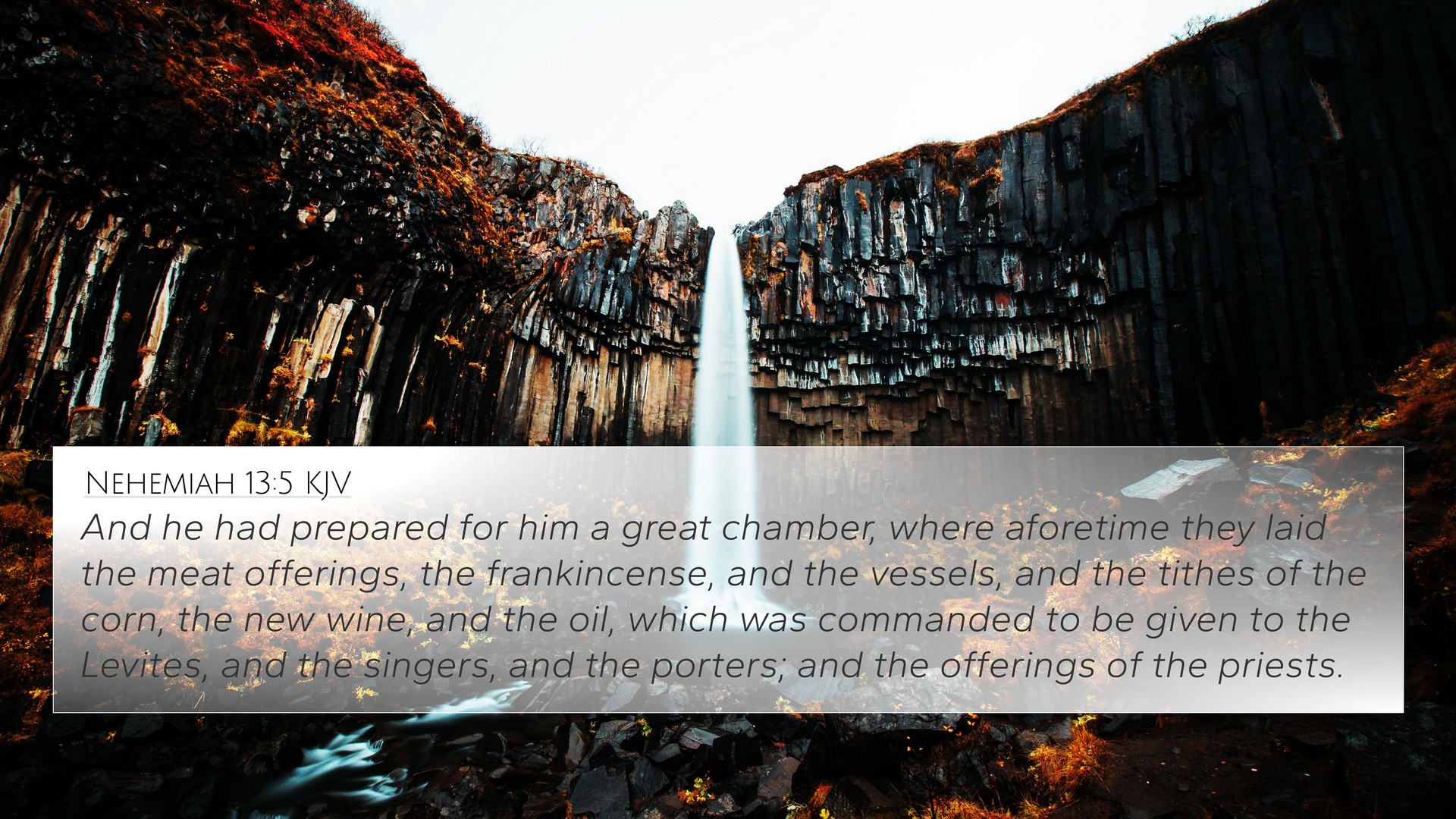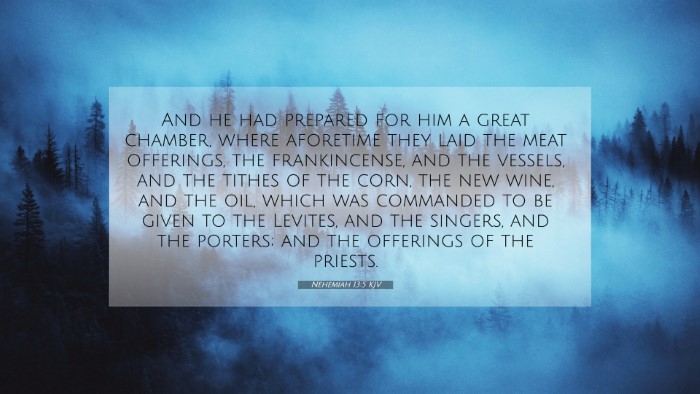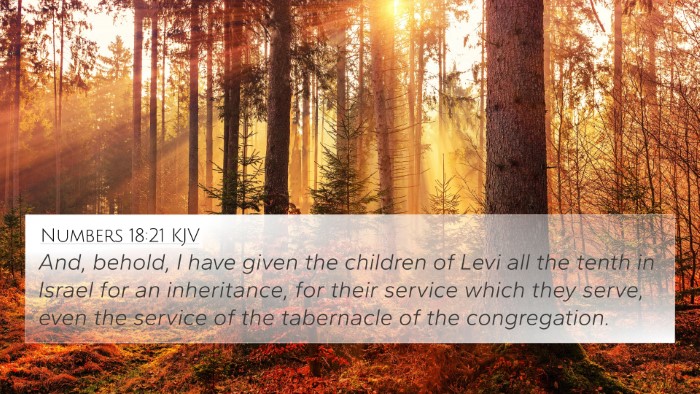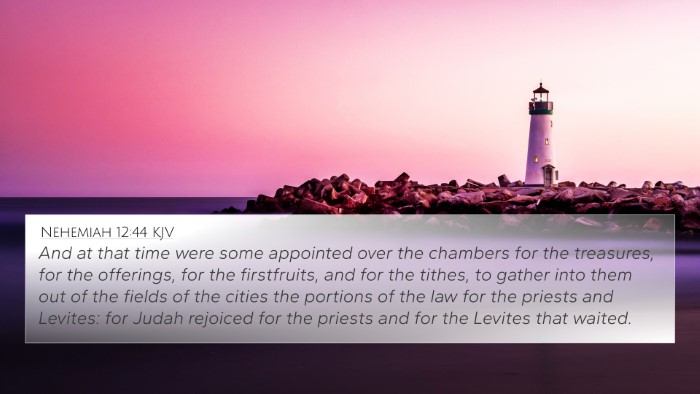Understanding Nehemiah 13:5
Nehemiah 13:5 states:
"And he had prepared for him a great chamber, wherein formerly they laid the meat offerings, the frankincense, and the vessels, and the tithes of the corn, the new wine, and the oil, which was commanded to be given to the Levites, and the singers, and the porters; and the offerings of the priests."
This verse depicts a critical moment during Nehemiah's leadership, where he addresses the corruption and neglect of God's temple offerings. The significance of this passage can be distilled into several key insights derived from public domain commentaries.
Key Insights from Commentaries
-
Matthew Henry:
Matthew Henry emphasizes the theme of restoration found in Nehemiah's actions. He suggests that the re-establishment of the chambers for Levitical services indicates a return to proper worship and a structural adjustment in the community life aimed at honoring God.
-
Albert Barnes:
Barnes notes that Nehemiah is rectifying the situation where those dedicated to serving in the temple were being neglected. The references to meat offerings and other provisions reflect the importance of sustaining those who are tasked with spiritual responsibilities.
-
Adam Clarke:
Clarke points out the communal aspect of the offerings, explaining how the tithes and offerings were essential to maintain the spiritual order within Israel. He draws attention to the fact that the Levites and other temple officials were engaged in significant tasks, which required adequate support via the offerings provided to them.
Thematic Connections and Cross-References
Nehemiah 13:5 has several thematic parallels throughout scripture, illustrating the importance of proper offerings and the role of temple worship.
- Malachi 3:10: Encourages bringing the full tithe into the storehouse, emphasizing God's provision for the temple.
- 2 Chronicles 31:4-5: Details Hezekiah’s reforms in providing for the priests and Levites, similar to Nehemiah’s actions.
- Ezra 10:6: Reflects the sincerity of dedication to temple service, which Nehemiah also aims to reinforce.
- Leviticus 27:30: Discusses the holiness of tithes and their role in maintaining a relationship with God.
- Deuteronomy 14:22-29: Details how Israel was to care for the Levites and the poor during their festivals.
- Hebrews 7:5: References the priestly order of the Levites and the significance of tithing.
- 1 Corinthians 9:13-14: Declares that those who proclaim the gospel should earn their living from the gospel, echoing Nehemiah's intentions.
- Luke 10:7: Jesus instructs his disciples to accept support, furthering the importance of sustaining those in ministry.
- Acts 4:34-35: Chronicles early Christian communal efforts to support the apostles and ministry roles.
- Philippians 4:15-16: Paul acknowledges the financial support from the Philippians for ministry work, resonating with the themes found in Nehemiah 13.
Application and Contemporary Relevance
Nehemiah 13:5 serves as a reminder of the importance of honoring God through the proper channels of worship, including providing resources for spiritual leaders. In our modern context, this passage encourages believers to consider how they support their local churches and spiritual leaders.
Tools for Cross-Referencing
For those seeking to explore connections within scripture, there are several tools and methods for effective Bible cross-referencing:
- Bible Concordance: Utilize this resource to locate themes and topics across different books of the Bible.
- Bible Cross-Reference Guide: Helps to find related verses that expand on specific concepts found in Nehemiah 13:5.
- Cross-Referencing Bible Study: Engaging in comparative studies can reveal deeper theological insights.
- Comprehensive Bible Cross-Reference Materials: Resources that compile extensive lists of related verses for thorough study.
- Bible Reference Resources: Utilize apps and online resources dedicated to scripture study for identifying interconnections.
Conclusion
Nehemiah 13:5 encapsulates the themes of restoration, worship, and proper support for spiritual leaders, which are vital in both ancient Israel and today's church. Through careful study and cross-referencing with other scripture, believers can gain a deeper understanding of their faith and the importance of community support in worship. As we dissect these themes, let us remain committed to the principles of giving and supporting our spiritual leaders as mandated in God's Word.






